| Much Adu about Apple Pie, Pilgrimage to Jomosom Day
4: Marpha to Tukuche (2 hours)
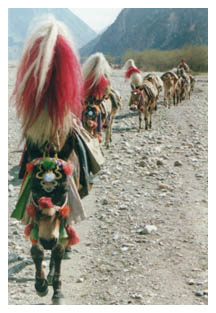 We
had been trekking pretty fast for the last three days and decided to
make today a slow and relaxing day, to stop and smell the apples. We
slept in and had a leisurely breakfast, that should have been classified
a lunch. It also allowed us the time to get in a bit of laundry
yesterday, knowing that we'd have time to let it dry. We finally headed
out about noon and made our way to Tukuche over a relatively easy
stretch of trail. The trail took us through a dry riverbed that we
mainly shared with the numerous donkey trains. The ones heading in our
direction carried empty sacks, while those on the return journey were
filled to the brim, carrying goods for the many villages through the
lower Mustang area. We
had been trekking pretty fast for the last three days and decided to
make today a slow and relaxing day, to stop and smell the apples. We
slept in and had a leisurely breakfast, that should have been classified
a lunch. It also allowed us the time to get in a bit of laundry
yesterday, knowing that we'd have time to let it dry. We finally headed
out about noon and made our way to Tukuche over a relatively easy
stretch of trail. The trail took us through a dry riverbed that we
mainly shared with the numerous donkey trains. The ones heading in our
direction carried empty sacks, while those on the return journey were
filled to the brim, carrying goods for the many villages through the
lower Mustang area.

Donkey train
bringing supplies to Lower Mustang
We headed to the lodge run by a very
close family of Devi's. He told me his sister was there. The family was
very close to Devi and whenever he trekked through there with clients,
they stayed at their lodge. A few years back, Devi stopped in Tukuche
with clients during the Tihar festival held in late November on the day
of Bhai Tika. On that day, sisters give tikas, a blessing of sticky
paste made of rice and colored powder, to their brothers wishing for
their long life, health and happiness. And brothers return the favors
with gifts of clothing, sweets and fruit. Devi was far from his home and
away from his three sisters. That night in the lodge, the young girl of
the house, who adored Devi for he gave her brotherly attention and help
whenever he stayed at their home, blessed him with a tika during the
festivities. Since then, he always refers to her as his bahini, his
little sister, and I believe the bond is no less weaker than blood.
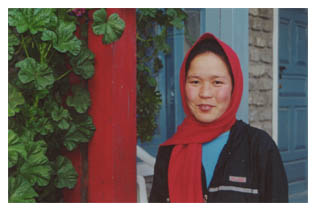
Devi's 'sister' in
Tukuche, she's got the cutest apple cheeks
Tukuche itself, is the younger
sister of Marpha, the less showy and thus less visited kin. While many
make Marpha a destination, most choose Tukuche only when their tired
muscles demand it. But that would be a mistake. Tukuche has a very
unusual feature that most don't bother exploring or even know about, its
private temples and monestaries. The area itself used to be a thriving
stop on the trading routes between India and Tibet and Buddhism was long
established. The village boasted a number of bustling monestaries but a
stagnating trade culminating in the invasion of Tibet, slowly drained
Tukuche of its vibrance and the monk number dwindled to nothing. To save
the small and intimate sanctuaries, the maintanence was taken over by
local citizens who keep up the temples through donations by pilgrims and
tourists alike. But time and tourists alike has forgotten them and weeds
grow over the doors, gardens abut the exterior walls, and laundry hangs
from the spires. Many of the smaller ones are completely encircled by
homes, giving you the distinct feel of a monastic garage. Others are
larger and are home to their caretakers. To visit them, find the
'owners' who will unlock the doors and either give you a tour or, and
this is more likely, leave you to explore on your own. The temples are
dark, dusty and in many ways, exactly as they were hundreds of years
before, as if the monks closed up for the evening and just never came
back. One of the most interesting is in one home's backyard. You
enter through the gate and interrupt the lady of the home who will
probably be washing laundry and hanging it from the top of the temple.
She may act too busy to be bothered to find the keys, but the mention of
a donation may compel her to leave her laundry for a moment. Note the
thick dust covering the lonely Buddha at the alter and the cobwebs
strung throughout.
The other feature that Tukuche
boasts is the distillery that churns out apple and apricot brandy. If
you're lucky, it'll be open and you can sip samples. If not, you can try
and buy their product all over town, as well as some of the best apricot
jam and dried fruits.
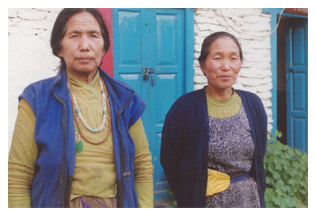
The two mothers of
the house, older mother and younger mother
I discovered the interesting
arrangement of the lodge household. The father of the house had taken a
second wife when the first was unable to conceive. She had a number of
children, including Devi's 'sister.' A few years back he died and the
wives get so well, they both stay together running the lodge. The two 'aamas'
were so wonderful, we ate in the kitchen, heaping platters of dhal bhat
and meat curry, and then retired to the common room to laugh and talk
over Tukuche's finest, late into the evening.
Another close friend of the family
was there, a Sherpa from the Solu Khumbu region who was a famous
mountaineer and now retired with a lodge in Namche. He regaled us with
tales of his five successful ascents of Everest as well as his work
later in the Royal Nepal Army training commandos in mountain warfare in
the barracks above Jomosom. It was through his time there that he became
such good friends of the family. I was sad to leave. My heart as well as
my bag was heavier as we walked away, the bag laden down with gifts of
homemade apricot jam and dried fruits.
Day 5: Tukuche to Ghasa (6 hours)
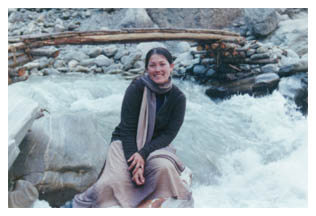
Today was a long day, full of ups
and downs and relatively difficult trail. At one point, after we had
crossed a bridge, we had to hurry across the sandy lip of a large
landslide that threatened to keep rolling down the mountain. But it was
also the most varied terrain yet, as we descended into the lush
lowlands, full of forests and rivers.
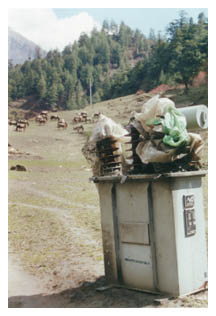
If we only take the time to look and
see, there are so many fascinating things along the trail. Small details
to be savored. Items that draw a fuller picture of life in Nepal.
Just outside of one village, we came
across a large transformer of some sort. It was sitting peacefully
amidst a herd of grazing cows. Tarps were strewn across the top in a
feeble attempt to perhaps protect it. Some locals down the road gave us
the scoop. So the story goes, the villagers were pressuring the district
govt to bring electricity to the area. What finally arrived was the big
monstrosity itself with any accompanying instructions. They kept it a
long while in the village, but as they could never figure out how to get
it to work, left it in the fields and stocked up on candles and
kerosene.
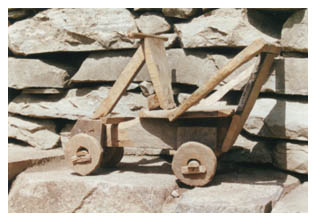
A little later, just after crossing
a large bridge, we rested on the stone chautara outside of a home. There
on the stone stoop was a lovely wooden push cycle, it's wheels
off-kilter, the seat a tad uncomfortable but full of endless fun. These
objects of fascination were everywhere, if we just took out the time to
notice them. Details that make life richer.

Full size door
entrance to a walled off field of weeds
We arrived in Ghasa after a
long and full day. It was almost dark, and as we rounded the corner, I saw the
first lodge and it sign welcoming us to Florida. Devi told us to keep going,
to the last and best lodge in town. What he failed to mention is that Ghasa is
long and spread out. But we got to see the lay of the land, as we trudged
through the town on our last legs.
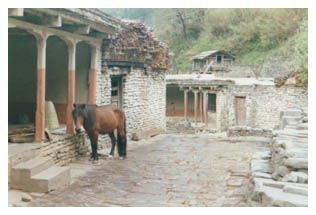
Ghasa stretched out for
over half an hour's walk. The town was made up of short squat stone
buildings whitewashed and decorated with touches of maroon and rusty red
paint. I think I was too tired to appreciate it all.
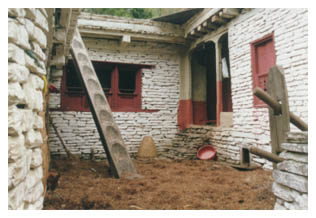
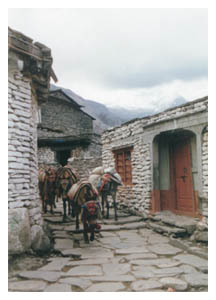 Courtyard
stable area with rooftop access Courtyard
stable area with rooftop access
We finally arrived at the
lodge, hungry and tired. We took care of them in that order.
Donkey train making
its way through the cobblestone street of Ghasa.
next
| Day 4-5 |
back
|
